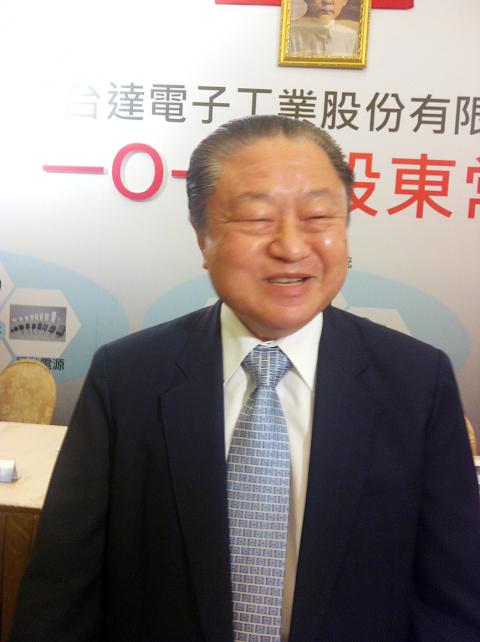Delta Electronics Inc (台達電) chairman Bruce Cheng (鄭崇華) yesterday announced plans to retire after steering the world’s top manufacturer of switching power supplies for four decades.
Cheng’s announcement came after the company’s shareholders’ meeting gave the green light to a NT$3.5 cash dividend per share based on last year’s net income of NT$10.99 billion, or NT$4.58 earnings per share.
“It is time for me to step aside so younger people can fill the vacancy,” Cheng said. “I have been working for 52 years and have been with Delta Electronics since its establishment 42 years ago.”

Photo: Tsai I-hsuan, Taipei Times
The Taipei-based company will elect a new chairperson in its board meeting on Thursday next week, he said.
Delta Electronics vice chairman and chief executive Yancey Hai (海英俊) is expected to assume the leadership, assisted by Delta general manager Mark Ko (柯子興) and Delta Electronics China president Cheng Ping (鄭平), the eldest son of Bruce Cheng, local Chinese-language media reported.
Delta Electronics, in which foreign investors own more than 50 percent of shares, will not become a family-run company, but family members and friends might vie for promotions on an equal footing with other employees, Bruce Cheng said.
The outgoing chairman apologized on behalf of the company for missing its earnings target last year, because of soft demand for power adapters used in notebook computers, he said.
Meanwhile, the company’s solar energy business remains a drag on profitability as global governments cut subsidies amid economic uncertainty, he added.
Delta Electronics will continue to invest in the development of solar energy sources, the 76-year-old Cheng said, adding that he remains positive on the business outlook for alternative energy sources.
Bruce Cheng said that after retiring, he would like to work as a volunteer to advance environmental protection, since he is familiar with and has know-how on the issue.
“Human beings cause a lot of damage to the Earth in the pursuit of a better quality of life,” as evidenced in the increase in fatal natural disasters and dwindling natural resources, he said.
Delta Electronics shares closed down 1.78 percent at NT$88.4 yesterday, weaker than the TAIEX’s 0.11 percent decline, the Taiwan Stock Exchange’s data showed.
However, Credit Suisse kept its target price for the company unchanged at NT$106 in a recent research note, impressed by its interactive studio for education and its mobile charger solution unveiled at the Computex trade show earlier this month.

Nvidia Corp CEO Jensen Huang (黃仁勳) today announced that his company has selected "Beitou Shilin" in Taipei for its new Taiwan office, called Nvidia Constellation, putting an end to months of speculation. Industry sources have said that the tech giant has been eyeing the Beitou Shilin Science Park as the site of its new overseas headquarters, and speculated that the new headquarters would be built on two plots of land designated as "T17" and "T18," which span 3.89 hectares in the park. "I think it's time for us to reveal one of the largest products we've ever built," Huang said near the

China yesterday announced anti-dumping duties as high as 74.9 percent on imports of polyoxymethylene (POM) copolymers, a type of engineering plastic, from Taiwan, the US, the EU and Japan. The Chinese Ministry of Commerce’s findings conclude a probe launched in May last year, shortly after the US sharply increased tariffs on Chinese electric vehicles, computer chips and other imports. POM copolymers can partially replace metals such as copper and zinc, and have various applications, including in auto parts, electronics and medical equipment, the Chinese ministry has said. In January, it said initial investigations had determined that dumping was taking place, and implemented preliminary

Intel Corp yesterday reinforced its determination to strengthen its partnerships with Taiwan’s ecosystem partners including original-electronic-manufacturing (OEM) companies such as Hon Hai Precision Industry Co (鴻海精密) and chipmaker United Microelectronics Corp (UMC, 聯電). “Tonight marks a new beginning. We renew our new partnership with Taiwan ecosystem,” Intel new chief executive officer Tan Lip-bu (陳立武) said at a dinner with representatives from the company’s local partners, celebrating the 40th anniversary of the US chip giant’s presence in Taiwan. Tan took the reins at Intel six weeks ago aiming to reform the chipmaker and revive its past glory. This is the first time Tan

CUSTOMERS’ BURDEN: TSMC already has operations in the US and is a foundry, so any tariff increase would mostly affect US customers, not the company, the minister said Taiwanese manufacturers are “not afraid” of US tariffs, but are concerned about being affected more heavily than regional economic competitors Japan and South Korea, Minister of Economic Affairs J.W. Kuo (郭智輝) said. “Taiwan has many advantages that other countries do not have, the most notable of which is its semiconductor ecosystem,” Kuo said. The US “must rely on Taiwan” to boost its microchip manufacturing capacities, Kuo said in an interview ahead of his one-year anniversary in office tomorrow. Taiwan has submitted a position paper under Section 232 of the US Trade Expansion Act to explain the “complementary relationship” between Taiwan and the US